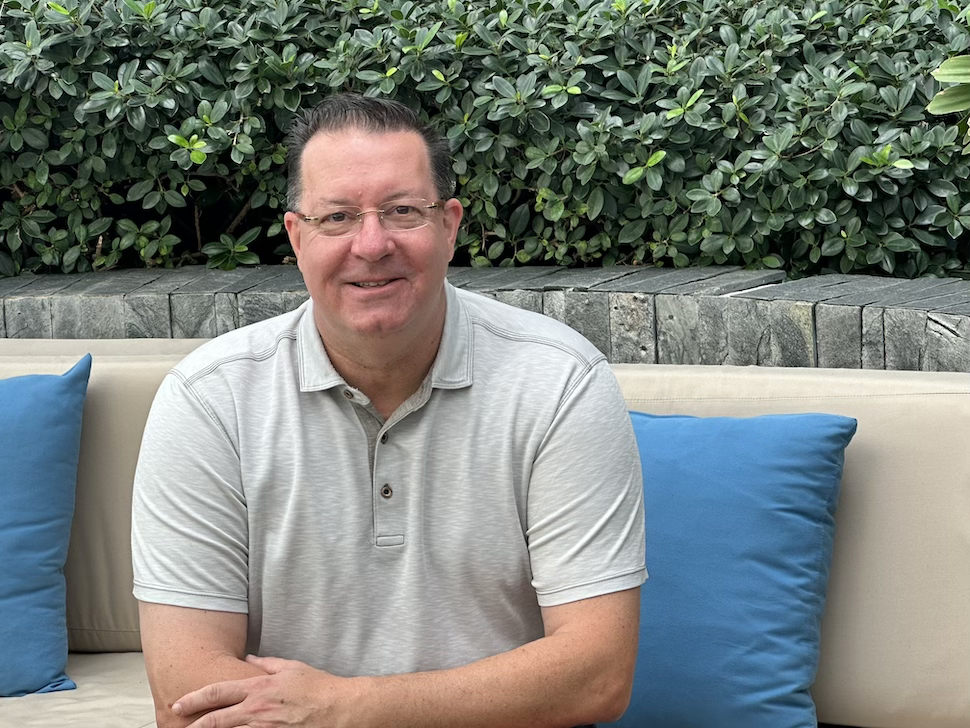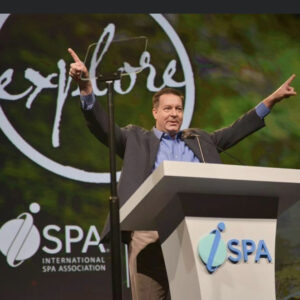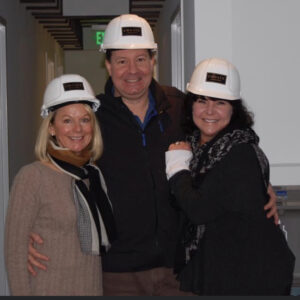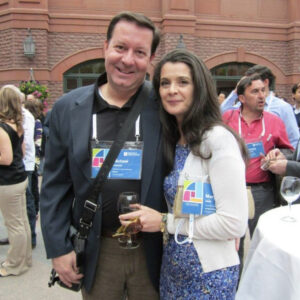
One of the many surprises of Michael Tompkins’ extraordinary business career is that he began his professional life as a nurse. That caring shows—and it has always been combined with remarkable vision—which will be celebrated in May 2024, when the International Spa Association honors Tompkins with the ISPA Visionary Award. Lynne McNees, president of ISPA, recognized Tompkins for his widespread influence. “Michael is the true model of a visionary leader,” she said. “His skills as a strategist and his dedication to building consensus and creating partnerships have been the core of his service to the spa industry. ISPA looks to Michael as a mentor, and we are so pleased to honor him for his far-sighted and inspired leadership.”
I spoke with Tompkins about his career, lessons learned, and the importance of a spa lifestyle in today’s high-pressure world.
Were you surprised?

2015, Tompkins leading the charge as ISPA Chairman
I was extremely surprised because I felt that for years I’ve been contributing to the mission of ISPA, and I thought maybe someday I’d get some kind of recognition—but I never thought I’d get the Visionary Award. This award is a gift back to me that came full circle and that I really appreciate because of the things that I did in spa that at the time were new in the industry—building a functional medicine practice in a destination spa at Canyon Ranch; concepting and building the first destination spa, Skanä, on the Oneida Indian Reservation (it was the first signing that PGA did with a minority owner); putting a spa in a weight-loss center at Hilton Health; and creating one of the country’s first concierge medical practices with a full spa at Palm Health. So, for me, it [coming full circle] was all these new business models that I was creating that people doubted would be successful that became new tracks to wellness in the spa industry.
Appreciation is a very fulfilling emotion.
Yes, it is. I spent my career following ideas that weren’t necessarily mine, but I always saw the pearl in the idea . . . and the tenacity of not letting it go until it actually was successful is sometimes emotionally grueling because oftentimes I was the only one who really believed in the idea, and some of the things have turned out to be huge successes—not all of them—there have also been tremendous failures. But I’m filled with appreciation for the ones that have been successful and for receiving the Visionary Award. I can recall all those times that I had a stomach ache, or the times a boss told me “if it doesn’t work, you’re fired,” and I still went with it—this award puts the cherry on top of a 30-year career.
What was your very first spa gig?
Canyon Ranch. I was the Nursing Director at 31 years old with a salary of $41,000.
What did you learn from that experience; what were your two biggest takeaways?

2012, Grand Opening Miraval Life in Balance Spa with Clarins, Steve and Jean Case, Philippe Bourguignon, Christian Courtin
The first is how blessed I was to learn from Mark Hyman and Mark Liponis, two amazing cutting-edge physicians in functional medicine. At that time, functional medicine was considered quack medicine. After 13 years of working in hospitals and short-term rehab, I saw that people continually returned again and again with the same diagnoses and health issues. At Canyon Ranch, we practiced a different way of medicine, and I saw that people healed and did not come back. This opened my eyes to alternative approaches to medicine—both in the way I wanted to practice and in my personal life with family and friends. My second takeaway: I experienced energy work which changed how I felt from a physical perspective. It really opened my eyes to alternative approaches to medicine as a healing tool, including massage.
What was your last spa gig?
CEO of Miraval. I started there in 2007, at age 40, and remained there for eight years.
Two biggest takeaways?
My first big takeaway, quite honestly, was the aesthetics of design—following Clodagh, working with Clodagh. She taught me how your eye should anticipate what you’re seeing visually, as you move toward that, it should constantly move to see beyond and beyond and beyond. Because of that, it creates a processional experience for the person walking through the space. Also, how to enhance how design can envelop your emotions by using light and shadow. I’ve used those two things from Clodagh in the design for my own homes. Working with Clodagh was the single most satisfying work experience of my life.
“What I’d like to convey to people is that the healing power of touch is what will sustain our industry forever.”

2016, Indigo Spa Hilton Head Health with Jane Segerberg and Lynne McNees
My second big takeaway was the physical and mental health benefit from mindfulness. We’re seeing so much mental illness, drug use, and suicide in today’s world where younger generations don’t engage in traditional forms of communication because they’re using cell phones and digital. I believe that if we incorporated the teachings of mindfulness from infant to senior it would be a balloon that could lift us from the situation we’re now in with mental illness.
Does spa have a responsibility to help do that?
I believe that spa does, because if we’re touting spa as a place of healing, if we don’t use spa for that then it just becomes very rote, which is why I question the long-term efficacy of some of the touch-free services. Not that they’re not beneficial, but I don’t think they have the energetic foundations that our bodies crave.
What is the responsibility of an ISPA Visionary Award winner?
To continue to question the things that impact our industry so that we can make it better.
What are you looking forward to these days?
I look forward to having lunch with my mother. I look forward to more ways to create more time for me. I look forward to celebrating happiness with family and friends, and I really look forward to the time when I’m truly comfortable with being me—and that’s the truth, that’s what I’m working toward.
Do you have a personal message that you’d like to share?

2012, Global Wellness Summit, Aspen Institute with Mary Bemis
I’ve thought about that, the full circle, and how what I tried to do in spa is to create experiences that touched people. What I’d like to convey to people is that the healing power of touch is what will sustain our industry forever.
What advice would you give to someone just coming into the industry?
Develop a back-up skill set because that gives you the power to say no to someone when they think they have the right decision. I got my massage degree because if I backed up against the nursing system, then I had something to fall back on, and I could always speak my mind freely.
What would you tell someone who’s leaving the industry?
I would say, remember the intent of the people who work in our industry—that it’s for the betterment of others—so don’t bash it after you leave it.
What would you tell someone who aspires to lead, to be a visionary?
Trust your gut and follow your heart.
Mary Bemis
Mary Bemis is Founder & Editorial Director of InsidersGuidetoSpas.com. An advocate for all things spa, Mary forged a vocabulary for spa reportage that is widely used by those who cover the issues today. Recently honored as a Top 30 Influential Voice Transforming Wellness by Medika Life, Mary is an inaugural honoree of Folio’s Top Women in Media Award. Her spa media roots run deep—in 1997, she launched American Spa magazine, in 2007, she co-founded Organic Spa magazine, and in between serving on the ISPA and NYSPA Board of Directors, she was on the launch teams of Luxury SpaFinder and New Beauty magazines. Named a "Wonder Woman of Wellness" by American Spa magazine, Mary was honored by the International Spa Association with the distinguished ISPA Dedicated Contributor Award. She is a special advisor to the non-profit Global Wellness Day.
- Web |
- More Posts(86)